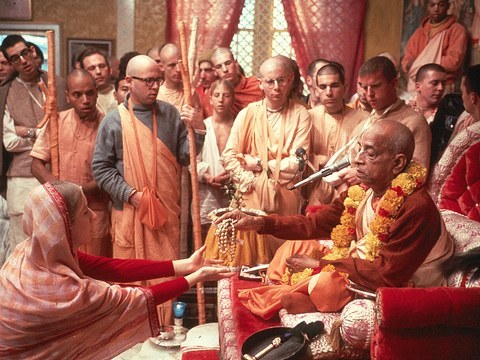Q. 1. In your Madhurya Kadambini – Hyderabad lecture you said that a person loses the taste for bhakti when he commits nama-aparadha and also there is a possibility he may turn averse to (against) guru and Krishna.
A person may get discouraged to chant (maybe my utter ignorance and foolishness) while knowing this effect of nama-aparadha being afraid of consequences.
Answer by Romapada Swami: Understanding the offenses related to chanting is meant to help us to properly approach the Holy Name with due reverence, with proper knowledge of Its transcendental nature and potency and thereby help us quickly achieve the desired success, Krishna-prema. Certainly, it is not meant to discourage us from chanting.
Although the Holy Names are so powerful, merciful and easily accessible, and they can easily vanquish all of one’s disqualifications including volumes of previous sinful reactions, there is one thing that is so devastating, that can cause such havoc and even make us averse to Krishna and devotional service – offenses. What are these offenses? — by understanding them one can take proper precautions to carefully avoid them.
For this reason, our acharyas have very compassionately delineated the offenses, elaborately describing the anatomy of offenses, their consequences and remedial measures, so that we can be aware and guard against the likely pitfalls and mistakes that conditioned souls are generally prone to. Often it is seen that a sadhaka-devotee may inadvertently or negligently fall prey to committing one or more of these offenses, or they may even be suffering from the consequences of offenses, such as lack of taste and weakening of faith, but unable to identify the cause or not knowing how to rectify. Hearing and discussing these topics from time to time, in the association of devotees, helps the devotee to recognize where their obstacles are and remedy the situation, or to stay on track and prevent such pitfalls.
Fire or electricity is greatly beneficial and essential but can also prove very dangerous if handled carelessly – and yet we cannot afford to live without fire. It is certainly helpful to understand the consequences of improper handling of fire and the proper precautions to be taken, but that should not make us hesitant to use fire to carry out our daily duties and take advantage of its numerous, indispensable benefits. Just as fire or electricity carries immense power, similarly the Holy Name, the Deity or the pure devotees carry immense spiritual potency and it is recommended that we approach them with due care and reverence lest we minimize or neglect them as ordinary.
Similarly, a student of chemistry who is about to perform a laboratory experiment is given a set of instructions and precautions, and is warned that there could be serious repercussions for neglecting them. The intention is that if one sticks to these precautions, one can avoid mishaps and achieve the desired result of the experiment; it is not meant to intimidate the student or stifle their enthusiasm, but to ensure their safety and success.
In a sense, this goes to show how scientific the process of chanting and devotional service is, in giving us such a detailed roadmap and such bold & clear signs by which we can identify progress as well as possible wrong turns! Rather than feeling unnerved, I would like to encourage you to take this as an impetus to approach the process of chanting with greater attentiveness, diligence and enthusiasm.
Everyone is encouraged to chant the Holy Name, for any attempt to chant the Holy Name is beneficial, but one cannot experience the full benefit when there are offenses. But, the Holy Name is very merciful indeed, and even if there are some offenses, by continuing to take shelter of the Holy Name without duplicity, by repeated chanting, and humbly submitting to the spiritual master who can guide us in chanting, offenses can be avoided and eliminated. If some offenses are committed accidentally or unintentionally, it can be rectified by properly regretting and seeking forgiveness from the vaishnavas and the offender can quickly be reinstated. Thus this is the most auspicious path.
On the other hand, if one hesitates to chant the Holy Name due to these considerations, then they remain in the treacherous material whirlpool – that is certainly not a better alternative.
Q. 2. If he becomes against guru and Krishna bhakti, how can he regain bhakti and be liberated from this situation. Kindly slash my ignorance with your transcendental explanation. In Bhagavad Gita, Sri Krishna says svalpam apy asya dharmasya trayate mahato bhayaat, “My devotees are never vanquished, they always succeed.”
Answer by Romapada Swami: Madhurya Kadambini gives the example that if a servant offends his powerful and wealthy master, the master may neglect him, and thus the servant suffers. But when the servant realizes his mistake, understands the feelings of the master, begs apology and continues to serve and try to please the master, the loving master quickly accepts him again.
Another example is just as a very sick patient loses all appetite, similarly a grievous offender may lose his attachment for hearing, chanting, and other devotional activities, and may even become averse and turn to sensual enjoyment. However, just as the patient’s sickness abates after some time, his appetite gradually returning, similarly after a period of aversion towards devotional service or forgetfulness and consequent suffering, their interest in devotional service is rekindled again. Just as a seriously diseased person is unable to derive nourishment even from a healthy diet of milk, but by continuing with proper diet and medicines, he gradually regains good health, similarly by taking shelter of the process of devotion, despite the lack of taste, the devotee gradually regains and returns to sincere engagement in hearing, chanting and serving. (Cf. Madhurya Kadambini Ch 3)
In this sense, it is true that a devotee is never vanquished. As Krishna promises, even a little bit of sincerely rendered devotional service never goes in vain. Krishna may neglect or seemingly punish a deviant devotee, but the suffering of such a devotee is not the same as the suffering of a non-devotee who never approaches Krishna. Srila Prabhupada likens the difference to the difference between the sufferings of an orphan and the suffering of a beloved child of the king. Although superficially they may seem similar, the king’s son is always under the care and vigilance of the father, and is sooner or later rectified and reinstated in his original position. (Cf. SB 1.5.19p)







